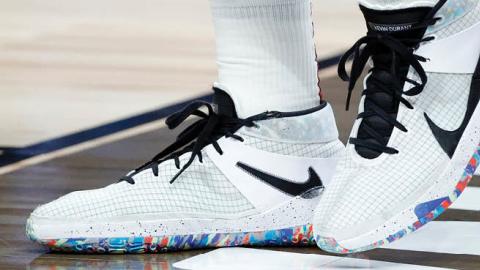With the NCAA Men’s Basketball Tournament in full swing, Americans are looking to March Madness as a welcome break from a year of devastating illness, social strife, and economic hardship. No one can blame fans for wanting to leave politics at the door and simply enjoy the competition. Yet Nike’s sponsorship of all six of the teams remaining in the tournament raises unavoidable questions about the connection between sports, corporate sponsors, and human-rights abuses.
The fact is that the student athletes representing these teams are unwittingly promoting a company that has been complicit in China’s genocidal campaign against Uyghur Muslims in the autonomous region of Xinjiang, which the Uyghurs call East Turkistan. Uyghurs in Xinjiang have been systematically imprisoned in “re-education” camps, used as forced labor, sterilized, and killed by the Chinese government. And though Nike has publicly claimed innocence, it is well-documented that the company has profited from these atrocities in the past.
In late 2019, the Australian Strategy Policy Institute reported that one of Nike’s factories in China employed an estimated 800 Uyghurs against their will. And while a “Statement on Xinjiang” issued by Nike in March 2020 claims that “an independent third-party audit confirmed there are no longer any employees from XUAR [Xinjiang Uyghur Autonomous Region]” at its facility in Qingdao, it’s unclear when this audit took place. (Incidentally, even this milquetoast expression of concern for the treatment of the Uyghurs has reportedly attracted the ire of the CCP, which is making noises about a potential boycott in response.)
What’s more, on-the-ground reporting by the Washington Post has confirmed that Uyghur workers were still employed at the factory against their will at least as late as February 2020. Nike claims that its code of conduct and audit protocols prohibit any involvement in forced labor and other human-rights violations. But how reliable can these safeguards be if they did not prevent Nike’s complicity up until the point when Uyghur workers were “no longer” at the Qingdao factory?
Nike has been similarly opaque about its response to activists’ efforts to hold the Chinese government accountable for its abuses. The company told the New York Times in November that it “did not lobby against” the bipartisan Uyghur Forced Labor Prevention Act, a bill designed to end the enslavement of Uyghurs in China. Yet this claim is undermined by its decision to partner with major fashion-industry associations that issued a public statement opposing the bill in September 2020.
Nike’s tepid response to concerns about the ethics of its doing business in China puts it at odds not only with the U.S. Congress, but with the Biden administration and many of America’s allies. The recent adversarial meetings between top American and Chinese officials in Alaska underscored China’s commitment to deflecting blame onto the United States rather than halting its horrific treatment of the Uyghur people. To its credit, the Biden administration has shown that it will not be cowed by China’s bullying, and has orchestrated a coordinated campaign with the European Union, the United Kingdom, and Canada to impose sanctions on two Chinese officials who were identified as “perpetrators of serious human rights abuse and corruption.” In announcing this sanctions regime, the U.S. and its allies took the significant step of calling China’s actions what they are — genocide.
Yet as important as these efforts are, their impact is significantly undercut when multinational corporations such as Nike continue to issue blanket denials of past complicity and undermine efforts to hold the Chinese government accountable.
Ultimately, the only way the United States and its allies will be able to stop the genocide of the Uyghurs is if China feels so isolated in the international community that it has no choice but to change its practices. As long as companies and individuals continue to invest in China despite Beijing’s human-rights abuses, there will be too little incentive for Chinese officials to change their behavior.
Consumers, athletes, and fans all have a role to play in demanding accountability from companies such as Nike. Teams competing in March Madness have a huge platform from which to build on the actions of the U.S. government and galvanize the American people to demand accountability from corporations that do business in China.
When the NCAA teams take the court this weekend, they should use their visibility to stand in solidarity with the Uyghur people and call on basketball fans across the country to take a closer look at the production practices of Nike and other companies like it. They should refuse to wear the Nike logo — and in turn, fans should join a campaign to pressure Nike until the company owns up to its past complicity in the Uyghur genocide and disassociates itself from efforts to defeat legislation that would prevent further violations of U.S. law prohibiting the importation of products made with forced labor.
By continuing to accept Nike as their sponsor, NCAA teams are allowing their student athletes to act as ambassadors for a company that profits from the misery and oppression of others. The players and fans — to say nothing of the Uyghur people — deserve better.
Read in National Review

















